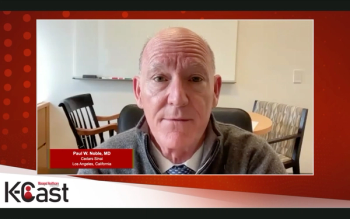
- MHE October 2022
- Volume 32
- Issue 10
Taking Long COVID-19 to Heart
The writer has firsthand experience with the testing physicians may order to find out whether COVID-19 has damaged a patient’s heart.
On the second anniversary of my April 2020 discharge from a Philadelphia hospital after a 20-day life-and- way-too-close-to-death bout of COVID-19, my primary care doctor decided it was time to see whether my heart and lungs were performing up to manufacturer specs.
Results of the first test, an in-office electrocardiogram, were normal. A pulmonary function test followed that, given my 13 days of intubation, came out remarkably well. Next was a CT scan of my lungs that showed some scarring consistent with my severe case of COVID-19 and ventilator-associated pneumonia.
The result of the fourth test, an echocardiogram, was less heartening. It showed my left ventricle ejection fraction at 51%, a pump or two within the normal range. But hey, normal is normal, right? Not for my doctor. A cardiology appointment later, I was scheduled for a nuclear stress test that would give my doctors a look at how well blood was flowing through the muscle of my heart.
VA study
My physician’s concern likely was prompted by the results from an observational study published in Nature Medicine earlier this year that included 153,760 veterans infected with SARS-CoV-2, the virus that causes COVID-19, 131,000 of whom were not hospitalized and 5,000 who were admitted to intensive care.
Findings from that influential study showed that one year later, no matter how mild their COVID-19 illness had been, the veterans were more likely to have cardiovascular disease of some kind than those in a comparison group who did not have COVID-19.
“We provide evidence that, beyond the first 30 days of infection, people with COVID-19 exhibited increased risks and 12-month burdens of incident cardiovascular diseases, including cerebrovascular disorders, dysrhythmias, inflammatory heart disease, ischemic heart disease, heart failure, thromboembolic disease and other cardiac disorders,” lead author Yan Xie, M.P.H., and his colleagues at the Veteran Affairs St. Louis Health Care System reported.
More specifically, those who had COVID-19 were 55% more likely than those in the non-COVID-19 group to have suffered a major adverse cardiovascular event such as a heart attack, stroke or death. Age, race, sex and medical conditions such as obesity, hypertension, diabetes, chronic kidney disease and hyperlipidemia played no role in who developed long-COVID-19 cardiovascular issues.
The findings caught the eye of other researchers. “Given the size of this analysis and given the end points looked at, and based on claims or coded data and notwithstanding the limitations of this kind of study, it suggests that all of those (cardiovascular complications) to a large degree are occurring at a higher rate, and in some cases an appreciably higher rate, from what we observe in comparison to contemporary controls that were not infected,” says Ty Gluckman, M.D., medical director of the Providence Center for Cardiovascular Analytics, Research and Data Science at Providence Heart Institute of Oregon in Portland.
In a Mayo Clinic podcast in March, Leslie Cooper, M.D., said that he was seeing a significant uptick in cardiovascular issues among patients with COVID-19 across all ages and fitness levels. “Many patients who are both young, healthy athletes, as well as older patients who had preexisting cardiac disease, will come into the clinic with shortness of breath or chest pain more than three months after COVID-19,” said Cooper, chair of the Department of Cardiovascular Medicine at Mayo Clinic in Florida in Jacksonville. “And at that point we start a search to figure out what could be causing their symptoms.”
The National Institutes of Health has started a large, multifaceted study called RECOVER (Researching COVID to Enhance Recovery) aimed at understanding how many people are affected by long COVID-19; the parts of the body that are affected, including the cardiovascular system; and pathophysiology.
“Are there predictors? Is this driven by one’s genetic makeup? Is it driven by the type of illness they initially had? Is it driven by other conditions that people have that make it more or less likely for them to manifest long COVID(-19) overall,” are among the questions Gluckman says he is anxious to have answered.
Several theories
SARS-Cov-2 is in the family of coronaviruses that can cause the common cold but also more severe diseases such as SARS (severe acute respiratory syndrome) and MERS (Middle East respiratory syndrome). Before 2020 and the beginning of the COVID-19 pandemic, researchers knew that infection with some types of coronaviruses is associated with cardiovascular disease and, more specifically, myocarditis, an inflammation of the heart muscle.
Researchers believe two things happen with SARS-CoV-2 infection that cause cardiovascular harm, Cooper explained in the Mayo Clinic podcast. The body responds by secreting pro-inflammatory proteins called cytokines and interleukins that rev up the immune system to destroy the intruder, Cooper explained. That immune reaction can cause damage that kills cardiomyocytes (heart muscle cells), he said.
SARS-CoV-2 can also cause blood clots by infecting the endothelial cells that line blood vessels. The clots can block arteries and interrupt blood flow, resulting in a range of cardiovascular complications including, at the severe end of the spectrum, heart attack and ischemic stroke.
Other explanations for COVID-19 cardiovascular disease have been proposed. Some evidence suggests that SARS-CoV-2 harms cardiomyocytes directly. Other research has pointed to dysregulation of the renin-angiotensin-aldosterone system. And different parts of the immune system may get throttled up and stuck in the “on” position, harming heart and other tissue in the process. The list of possible explanations is long; the list of definitive ones has nothing on it.
Specific treatment
Doctors are using the numerous established treatment protocols for the many types of cardiovascular disease when treating patients whose disease is apparently associated with long COVID-19, says Gluckman. A patient with heart failure who had COVID-19 would, for example, be treated similarly to one whose heart failure had other, non-COVID-19 causes. But, as Cooper noted in the podcast, researchers and clinicians hope to gain a better of understanding of COVID-19-associated cardiovascular disease so treatment can target the pathology specific to COVID-19. Strategies that tackle inflammation are among the leading candidates.
Vaccinations are not a panacea, but they do offer some protection. Two studies, one from Italy and the other based on the VA study, found that vaccinated people can still contract COVID-19 and develop long COVID-19. But vaccination may reduce the chances of developing long COVID-19 by as much as 15%; “one additional feather in the cap of vaccination,” notes Gluckman. “We have vaccines and other tools, including antivirals like Paxlovid, that exist to help us address a lot of these issues,” he continues. “The science needs to move along as quickly as possible so that we can better understand how to negate the risk of long COVID(-19) against all symptoms in the body.”
Vaccines that boost mucosal immunity, such as those delivered as a nasal spray, could also be an important addition to the toolkit. They may do a better job of preventing infection in the first place than the current crop of vaccines administered by injection.
As for me, I’m fine, thank you. A few days after completing the nuclear stress test, I received an email from my doctor. It said, “Your stress test looks good.”
Robert Calandra is a freelance writer in the Philadelphia area and a regular contributor to Managed Healthcare Executive®.
Articles in this issue
over 3 years ago
Healthcare’s Journey into the Metaverseover 3 years ago
Drugs and Older Age: An Increasingly Deadly Combinationover 3 years ago
Up, Up and Not Going Away: Cancer Drug Pricesover 3 years ago
Primary Care in Critical Conditionover 3 years ago
Drugs on the Fast Track as Treatments for PTSDNewsletter
Get the latest industry news, event updates, and more from Managed healthcare Executive.

























